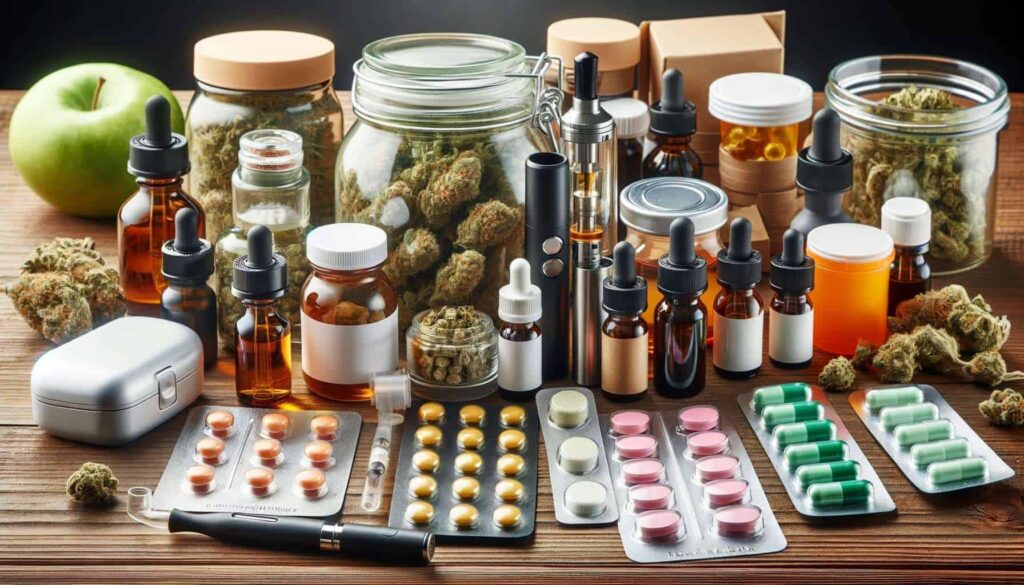- [email protected]
- (619) 304-4004
New York’s medical marijuana dispensaries offer a diverse array of products, from traditional flower to edibles, tinctures, topicals, and more. Each product is tailored to meet specific medical needs, ensuring safety and efficacy. This blog explores these options, highlighting the dispensaries’ commitment to patient care and education.
Medical Marijuana in New York

In New York, medical marijuana dispensaries offer an extensive range of products, catering to the diverse therapeutic needs of patients. These products, rigorously regulated under the Marijuana Regulation and Taxation Act, ensure safety and quality for consumers. Patients can find traditional flower strains, each with unique properties to address specific medical conditions like chronic pain, anxiety, or epilepsy.
Edibles, a popular choice for those preferring not to inhale, provide a discreet and long-lasting alternative. Tinctures and oils, known for their precise dosing, are ideal for patients seeking controlled and consistent relief. Topicals, applied directly to the skin, offer localized pain relief without psychoactive effects, making them suitable for patients new to medical marijuana or those avoiding systemic effects.
Capsules and pills, mirroring conventional medication forms, appeal to patients favoring familiarity and convenience. Vaporizers, offering a lung-friendly option compared to smoking, deliver quick relief. Additionally, CBD-dominant products cater to those seeking therapeutic benefits without the high associated with THC.
New York dispensaries, committed to patient education, guide users in product selection and safe consumption practices. This blog invites readers to explore the multifaceted world of medical marijuana products in New York, emphasizing the dispensaries’ role in providing safe, effective, and tailored patient care.
New York’s medical marijuana dispensaries offer a diverse range of products to cater to the varied needs and preferences of patients. These products are rigorously regulated to ensure safety and efficacy, providing patients with reliable options for their medical treatment.
Dispensaries in New York typically stock a variety of cannabis strains, each with unique properties to address specific medical conditions. Patients can find Indica, Sativa, and hybrid strains, offering different effects ranging from relaxation to energy and focus.
For those who prefer not to inhale their medication, edibles offer a discreet and long-lasting alternative. Available in various forms like gummies, chocolates, and baked goods, edibles provide sustained relief. Tinctures, another popular choice, allow for precise dosing and quick absorption when taken sublingually.
Cannabis oils and concentrates offer potent relief and can be used in vaporizers or ingested. Capsules and pills provide a familiar form of medication, ideal for consistent dosing. Topicals, applied directly to the skin, are perfect for localized relief without psychoactive effects.
CBD-dominant products are available for patients seeking the therapeutic benefits of cannabis without the high associated with THC. These products are particularly popular among patients new to medical marijuana or those sensitive to THC.
New York dispensaries are committed to providing high-quality, safe products. Rigorous testing for potency and contaminants ensures that patients receive effective and reliable medical marijuana.
New York’s medical marijuana dispensaries offer a wide array of products, from traditional flower to edibles, tinctures, oils, capsules, topicals, and CBD products. This variety ensures that patients can find products that suit their specific medical needs and consumption preferences, all within a safe and regulated environment.
Medical marijuana products available in New York dispensaries come in various forms, each offering unique benefits and uses. Understanding these differences can help patients choose the most suitable product for their specific medical needs.
Each product type in New York’s medical marijuana dispensaries caters to different patient needs and preferences, offering a range of therapeutic benefits. From immediate relief with traditional flower to long-lasting effects with edibles, and precise dosing with tinctures, patients have multiple options to manage their medical conditions effectively. The choice of product depends on the individual’s specific symptoms, lifestyle, and treatment goals.
Choosing the right medical marijuana product can be a crucial step in a patient’s treatment journey. With a variety of products available in New York dispensaries, patients need to consider several factors to select the most appropriate product for their specific medical conditions, desired effects, and personal preferences. Here are some strategies to help patients navigate this process.
Selecting the right medical marijuana product in New York involves a combination of understanding one’s medical condition, consulting healthcare providers, considering personal preferences, and utilizing the resources available at dispensaries.
By taking a thoughtful and informed approach, patients can find the most suitable medical marijuana product to effectively manage their symptoms and improve their quality of life.

Dispensary staff play a crucial role in guiding patients through the process of selecting the appropriate medical marijuana products. Their expertise and knowledge are invaluable, especially for patients who are new to medical marijuana or those exploring different options for their treatment.
Here’s an overview of how dispensary staff can assist patients in making informed choices.
Dispensary staff in New York are a key resource for patients looking to navigate the world of medical marijuana. Their role extends beyond mere sales; they act as educators, advisors, and support systems, ensuring that patients make well-informed decisions about their medical marijuana treatment.
This personalized assistance is crucial in helping patients find the most effective and safe products for their specific health needs.
The effectiveness of medical marijuana products can vary significantly depending on the medical condition being treated. Understanding which products are best suited for specific conditions like chronic pain, PTSD, cancer-related symptoms, and neurological disorders is crucial for effective treatment.
Here’s an analysis of the suitability of different medical marijuana products for these conditions.
The effectiveness of medical marijuana products for specific medical conditions depends on the active compounds in the product and the method of consumption.
Chronic pain may be best addressed with THC and CBD balanced products, PTSD with high-CBD products, cancer-related symptoms with high-THC strains, and neurological disorders with CBD-dominant products.
Patients should consider their personal needs, preferences, and medical advice to choose the most appropriate product for their condition.
While comprehensive clinical research on medical marijuana is still evolving, numerous case studies and anecdotal reports have highlighted the efficacy of various medical marijuana products in treating specific medical conditions.
These real-world examples provide valuable insights into how different cannabis products can be used effectively for therapeutic purposes.
These case studies and anecdotal reports underscore the potential of medical marijuana as a therapeutic tool.
While they provide valuable insights, it’s important to approach these findings with an understanding that individual responses to medical marijuana can vary, and what works for one patient may not work for another.
Continuous research and clinical trials are essential to fully understand and harness the therapeutic potential of medical marijuana.
The quality control and safety of medical marijuana products are paramount, particularly in a regulated market like New York. The state’s regulatory framework is designed to ensure that patients receive safe, effective, and high-quality medical cannabis.
This framework plays a critical role in safeguarding patient health and maintaining the integrity of the medical marijuana program.
Rigorous Quality Control Standards
Ensuring Patient Safety
Compliance with State Laws
Patient Education and Support
Economic and Social Equity Considerations
The quality control and safety of medical marijuana products in New York are underpinned by a comprehensive regulatory framework. This framework ensures that products are not only effective but also safe for patient use.
It encompasses everything from rigorous testing and accurate labeling to dispensary regulations and staff training, all aimed at protecting patient health and ensuring the responsible use of medical cannabis.
Lab testing is a critical component in the quality control and safety assurance of medical marijuana products. In New York, as in many regions where medical cannabis is regulated, lab testing for potency and contaminants is mandated to ensure that products meet stringent health and safety standards. This testing plays a vital role in safeguarding patient health and maintaining the integrity of the medical marijuana program.
Ensuring Potency and Efficacy
Identifying and Eliminating Contaminants
Compliance with Regulatory Standards
Supporting Informed Decision-Making
Lab testing for potency and contaminants is a cornerstone of the medical marijuana industry, particularly in regulated markets like New York. It ensures that products are safe, effective, and consistent, which is essential for the therapeutic use of cannabis.
This rigorous testing regime not only protects patient health but also enhances the overall credibility and reliability of the medical marijuana program.

In New York, the regulation and oversight of medical marijuana products are critical to ensuring the safety, quality, and efficacy of these products. State agencies play a pivotal role in this process, setting standards, enforcing regulations, and monitoring compliance.
Understanding the roles of these agencies provides insight into how medical marijuana products are regulated in New York.
The regulatory oversight of medical marijuana products in New York is a comprehensive and multi-faceted process, involving several state agencies.
The Office of Cannabis Management and the New York State Department of Health are at the forefront of this process, ensuring that all aspects of the medical marijuana program meet the highest standards of safety, quality, and efficacy.
This regulatory framework not only protects patients but also enhances the credibility and reliability of the medical marijuana industry in New York.
The regulatory framework governing medical marijuana in New York significantly influences both the availability and quality of products.
These regulations, designed to ensure patient safety and product efficacy, have a direct impact on how medical marijuana is cultivated, processed, distributed, and sold in the state.
The method of consuming medical marijuana can significantly impact its effects and benefits. Patients have access to various consumption methods in New York, including smoking, vaping, edibles, tinctures, and topical applications.
Each method offers distinct advantages and experiences, making it important for patients to understand their differences.
The choice of medical marijuana consumption method depends on the patient’s specific needs, preferences, and medical conditions. Smoking and vaping offer rapid relief but involve inhalation, while edibles provide longer-lasting effects but with a delayed onset.
Tinctures offer a balance between ease of use and controlled dosing, and topicals are best for localized symptoms without systemic effects. Patients should consider these factors and consult with healthcare providers to determine the most suitable method for their treatment.
New York dispensaries offer a variety of medical marijuana products, including edibles, tinctures, oils, capsules, topicals, and vaporization products. The availability of specific strains and product types may vary by dispensary.
Yes, New York’s medical marijuana program has specific regulations that may restrict certain types of products or methods of consumption. For example, traditional smoking of cannabis is not permitted under the program.
Patients should consult with a healthcare provider registered with the New York State Medical Marijuana Program to discuss their medical condition and treatment options. Dispensary staff can also provide guidance on product selection based on the patient’s needs and preferences.
Patients need a certification from a registered healthcare provider, not a traditional prescription, to purchase medical marijuana products. They also need to be registered with the New York State Medical Marijuana Program and have a valid patient ID card.
Many dispensaries in New York offer delivery services for medical marijuana products. However, the availability of delivery services may vary depending on the dispensary and the patient’s location.
New York’s medical marijuana program offers a diverse array of products, catering to the specific needs of patients with various medical conditions.
The state ensures the safety and efficacy of these products through a stringent regulatory framework, which includes rigorous testing for potency and contaminants. This commitment to quality control and patient safety is paramount in maintaining the integrity of the program.
Healthcare providers and dispensary staff play a crucial role in guiding patients, offering expert advice on product selection tailored to individual health needs.
The availability of different forms of medical marijuana, from edibles and tinctures to oils and topicals, provides patients with multiple options for treatment, enhancing their quality of life.
Overall, the program exemplifies a balanced approach to healthcare, prioritizing patient well-being while ensuring compliance with safety and quality standards.
https://cannabis.ny.gov/patients
https://www.mpp.org/states/new-york/
https://norml.org/laws/new-york-penalties-2/
https://cannabis.ny.gov/practitioners
https://cannabis.ny.gov/medical-cannabis
https://cannabis.ny.gov/medical-cannabis-program-faqs

A1 Marijuana Doctors is an online platform, that connects marijuana patients to marijuana doctors in their state.

A1 Marijuana doctors is an online platform that connects medical patients to medical marijuana doctors. We offer a quick & easy way to apply for a medical marijuana card in all legal states.
Social Links
Contact Us
Quick Links
Trusted By




This website does not sell medicine nor controlled substances. It is a network of doctors & nurse practitioners, not a pharmacy / dispensary.
Copyright ©2023 A1 Marijuana Doctors. All rights reserved.